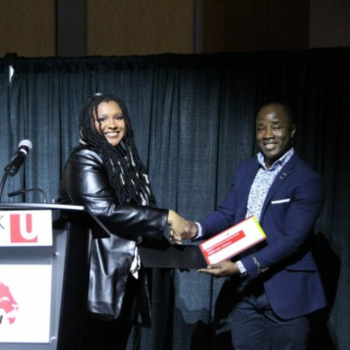In a desire to commit, in material ways, to York University’s Decolonizing, Equity, Diversity and Inclusion (DEDI) Strategy, the Faculty of Graduate Studies (FGS) held several roundtable discussions at its Faculty Council. From these discussions, a motion to infuse a commitment to DEDI into the standing committees of FGS council was passed.
The roundtables revealed lived experience of Black graduate student isolation and a pressing need for mentorship and community building. FGS hosted several conversations with Black graduate faculty, folding in Black graduate students to co-create a plan to address isolation and lack of community. It culminated in a Fall 2023 community gathering.
The Faculty’s work to reduce isolation and build community reflects an earlier FGS commitment to “partner with various programs at York and in the broader community to identify and dismantle the barriers that arise serially and increase over time to disadvantage and dissuade Black students from pursuing graduate studies, especially doctoral studies, in every discipline.”
Mentorship is a valuable way of assisting Black and racialized students in overcoming barriers to pursuing and thriving in graduate scholarship, offering students personal insights and support. Mohamed Sesay a Black professor who teaches courses and supervises graduate students, shared his thoughts with Innovatus on his own approaches to mentoring racialized students.
Sesay, an assistant professor of African studies and a native of Sierra Leone, views the barriers as an institutional challenge arising from their history. He realizes that universities were designed for immigrants who arrived here from 18th- or 19th-century Europe, making it clear to him that those from other cultures may find additional challenges in adjusting. He makes a conscious effort to serve as a mentor for graduate students from racialized backgrounds; eight of his 10 current graduate students are racialized.
“Institutions of higher education in western countries weren’t created for people like me,” said Sesay. “As a result, the structures, the rules and expectations, the standards and requirements were not put in place to accommodate graduate students like me or to help us thrive in the same way as non-racialized students.
“In order to do well, there are other issues for us that arise from the structures in place that someone who isn’t racialized may not be able to identify. People may not realize that many racialized students have grown up somewhere else, so they aren’t exposed to the same experiences as those who grew up in Canada. They come with a history that is different and it requires an effort to feel as if they belong to this space.”

Sesay said programs are opening space and incorporating decolonization, equity, diversity and inclusion, but “there is still a long way to go. If there were no issues with equality, we wouldn’t need DEDI.
“It’s not as if we’re compromising our standards,” he continued. “We expect racialized students to meet the same rigorous academic standards and expect them to be critical and creative thinkers, but we can’t be insensitive to other issues they’re dealing with, or they may not be able to fully realize their potential.”
In teaching and supervising racialized graduate students, Sesay takes the need to support them seriously and devotes time to connecting with them.
“I show understanding and empathy and try to share the challenges that I went through myself,” Sesay said. “I’m ready to talk with them and explore what they need to do to overcome challenges. I make myself available and, sometimes, that means talking about issues beyond research that impact academic excellence.
“I’m open to them, not dismissive. Canada is multicultural, but racialized minorities face difficulties trying to make this their home. I want to show them through my experience that it is possible for them to achieve excellence. There’s no straight roadmap or manual, but you can share understanding; you try to support them in navigating this space and boost their confidence.”
York’s Framework on Anti-Black Racism states, “Going forward, we will be responsible and accountable to the diverse constituencies of our community including Black community members, recognizing that bringing about systemic change is everyone’s responsibility.”
Sesay is a role model in accepting that responsibility.
Originally published in YFile.
